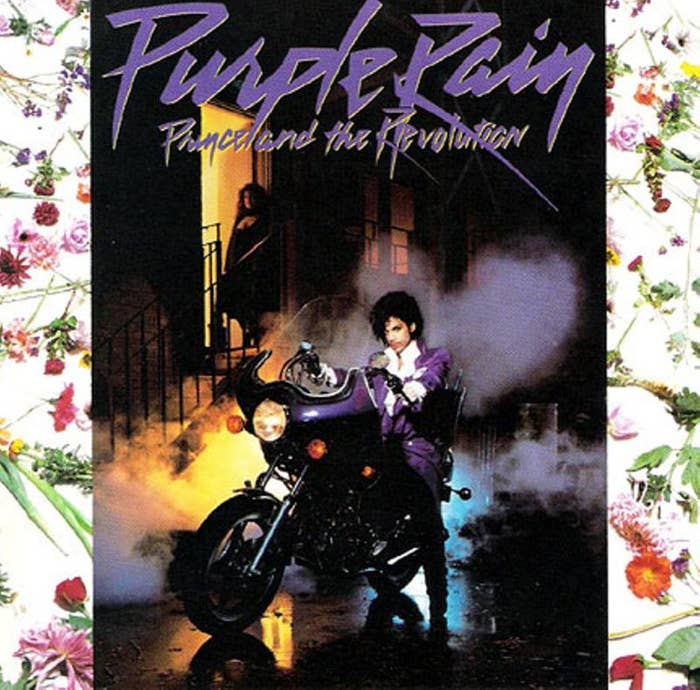
I don't have vivid memories of much, but I remember everything about the first time I watched Prince's Purple Rain. I was a Dave Matthews Band-listening college junior living in a sorry, mouse-riddled apartment on Hoffman Street in the Bronx, and me and my two roommates needed a way to pass an afternoon. Midday sun shone through the makeshift red curtains we had hung months earlier. And Purple Rain happened to be on Netflix. We obviously knew who Prince was, but none of us were fans. The album, or any of Prince's music, isn't what made us hit play—it was that cover. That image of Prince, in that purple suit, on that purple motorcycle, staring through the camera with his mouth slightly cocked and his eyes burning. The confidence Prince harnessed for that cover image is unfathomable—the power and assuredness of that single glance is at once inviting, mysterious, and dangerous. You can feel Prince's talent through it, and the complete certainty that what lies underneath it is the best, most singular thing ever made. Not that we acknowledged it at the time, but that one look was enough.
So much is noteworthy about Purple Rain—the bad acting, its mixed message towards women, the unbelievable performance pieces, Lake Minnetonka—but most of all is how clear it is that the movie is borne from one mind. From top to bottom, from the casting to the music to the story, Purple Rain is entirely Prince's vision. Before Kanye West made "Runaway," before Beyonce made Lemonade, there was Purple Rain.
Long before the movie came out, Prince worked through his ideas for it in a solitary notebook, and made it clear to his record label that the only way he was making a new album was if they let him make a motion picture to go with it. To Prince, Prince wasn't just a musician, no matter what anyone told him. "It wasn't even arrogance," Prince's former tour manager Alan Leeds told SPIN. "It was beyond confidence. It was destiny." Revolution keyboardist Lisa Cavallo added, "You know how he is—it wasn't about coming out with the next record. The next record had to be a whole environment."

And it is. From the "Dearly beloved..." that opens Purple Rain to the very end, which includes Prince spraying Minneapolis' First Avenue audience with foam before ending on a freeze-frame of the musician, basking in a glowing purple halo, the movie has a voice, feeling, and atmosphere like none other. It's rare to be able to watch something and immediately feel so close to its creator, to share his or her emotions, and to have a deep understanding that everything in the creator's life led up to what you see on the screen. Purple Rain was Prince's destiny, as Leeds said. But what's more remarkable is how palpable that destiny is to the audience. Communicating through a medium in that way isn't easy—it requires true genius.
I don't know that I can write about the performances—which were filmed live—in Purple Rain in a way that will do them justice. Every image is iconic. Haunting. Cathartic. The way Prince turns a love song into a threat when he asks Apollonia, "What's it gonna be, baby?" in "The Beautiful Ones," as a synthesizer howls in the distance; the lighting and choreography of the breakdown in "Computer Blue"; Prince vibrating on a raised platform, a black mask covering his eyes, along to the climax of "Darling Nikki"; the first chords of "Purple Rain," the repeating riff of Prince's guitar solo, and the twinkling of the keys as Prince rushes from the stage to his dressing room, and back again. They're moments unmatched in film since, and they're all the more amazing when you consider that Prince and the Revolution needed no more than three takes for each of those performances. As Cavallo said in that same SPIN interview: "I said to Prince, 'You know, Albert [Magnoli, Purple Rain director] is gonna want to do 20 takes.' And Prince, he almost changed color. 'I'll give him one take for each song.'"
It's easy to spot audience members crying during some of the movie's performances, and it's even easier to understand why.
At the end of Purple Rain, after Prince's demons are exorcized, after "Purple Rain," there's a celebration. Prince tiptoes to "I Would Die 4 U" and happily mimes the chorus, and then fully releases during "Baby I'm a Star." It's an outright declaration of joy and accomplishment. It's the happiest I've ever seen Prince. He did it. He unfurled the sharpness of his genius, and the brilliance of his vision, on the world, never letting a single doubter stop him. It's impossible not to share Prince's joy in that moment.
Prince was a star, the essential definition of one, and it's heartbreaking to know we lost him.

